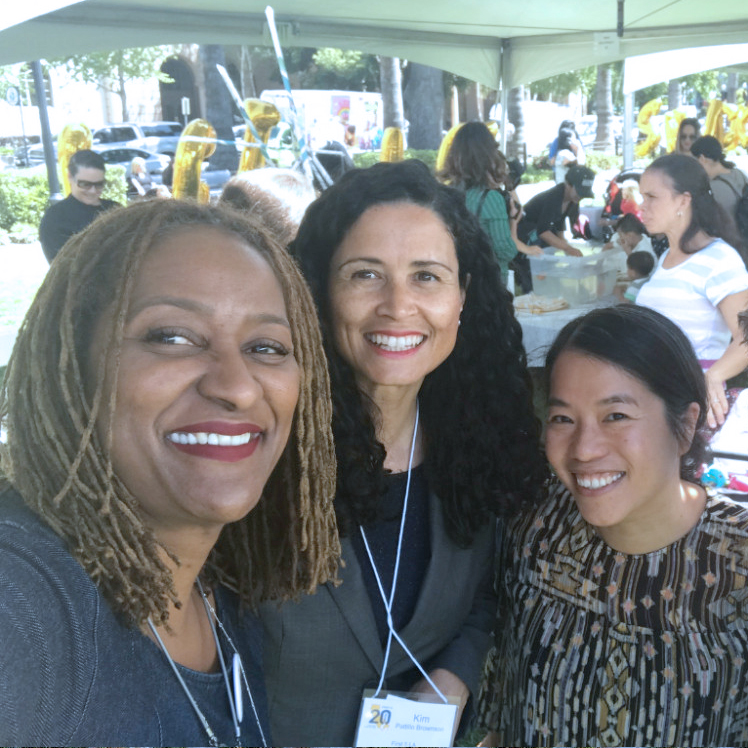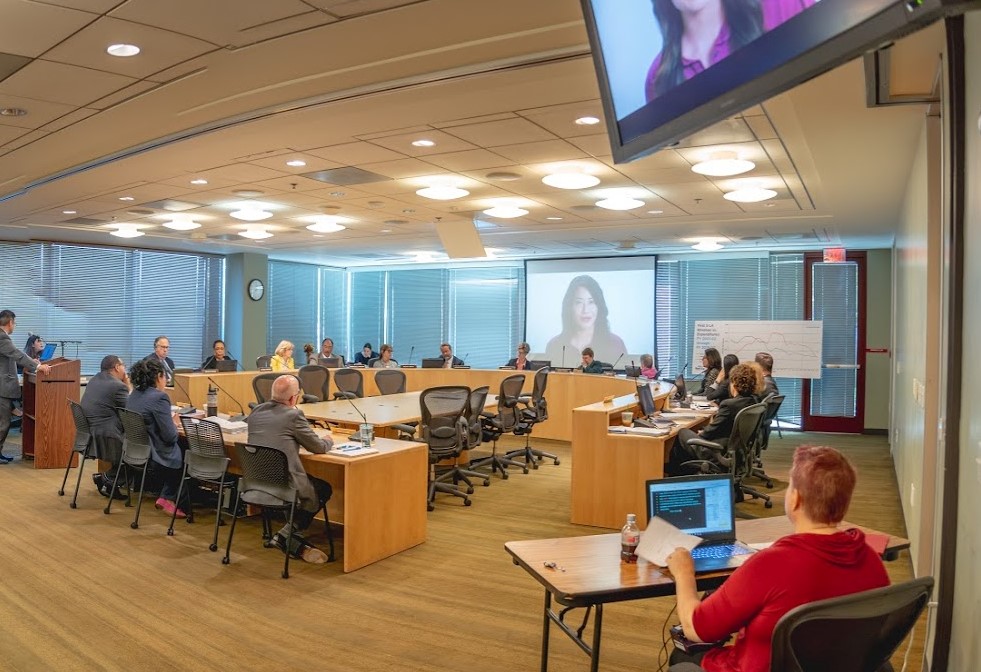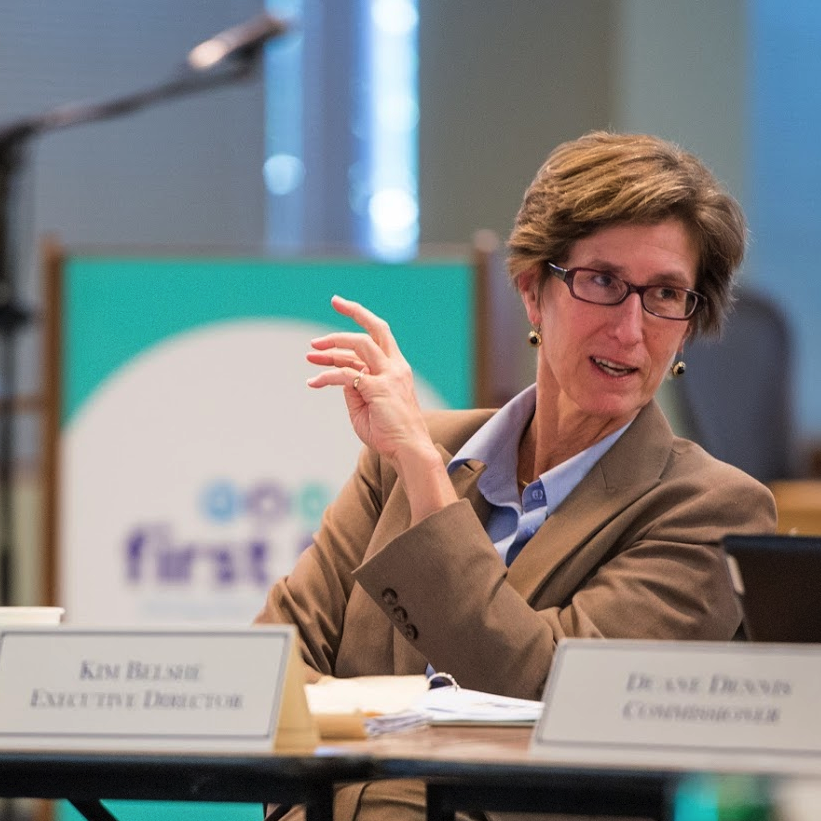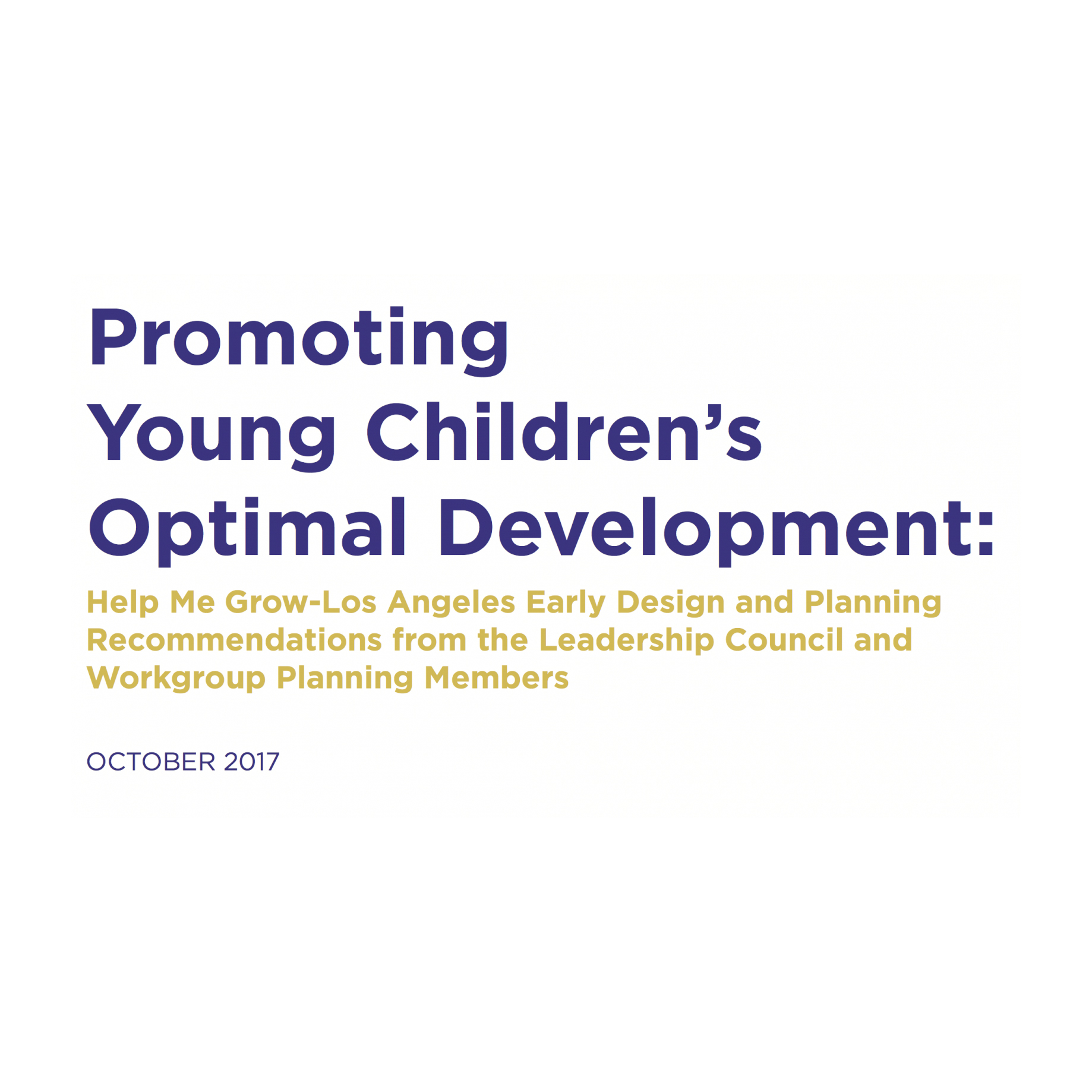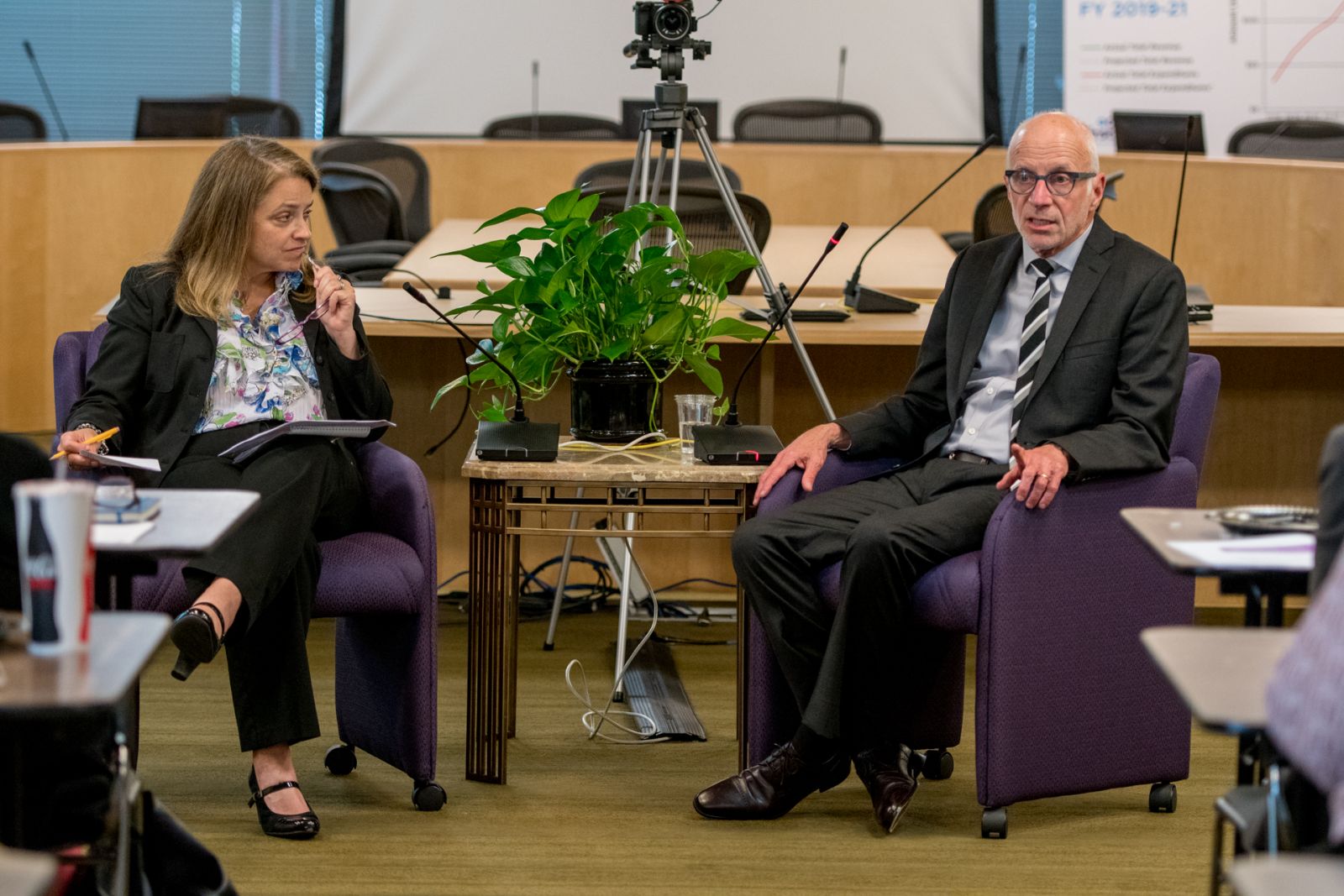

Help Me Grow LA – A PROJECT OF
OUR EARLY IDENTIFICATION AND INTERVENTION STRATEGY
Help Me Grow LA is here to make sure your child’s development is on track. Visit www.helpmegrowla.org or call 833.903.3972 for help!
Connecting Families to Developmental Resources
Help Me Grow LA (HMG LA) helps families find services that can support their child’s development. Families often have questions about their child’s development but don’t know where to go for help. HMG LA can help families find resources and get services more quickly. When it comes to helping families, we can work together — providers, local agencies and the community — to do better.
HMG LA helps improve the coordination of programs and services in local communities. First 5 LA and the Los Angeles County Department of Public Health (LACDPH) are joining with partners to make sure all children get connected to the services they need.
Background
In 2016, First 5 LA partnered with LACDPH, L.A. Care Health Plan and the American Academy of Pediatrics (AAP) – California Chapter 2, to convene key stakeholders and experts across diverse sectors to engage in the early design and planning of a HMG system for L.A. County. More than 120 leaders from L.A. County were part of the early planning process, including representatives in the areas of physical health, mental health, developmental disability services, early care and education, county agencies, private and public community organizations, as well as family support and advocacy groups. The Promoting Children’s Optimal Development recommendation report was released in the fall of 2017 and is the foundation that continues to guide implementation planning for HMG LA.
In 2017, First 5 LA and LACDPH began collaboration to bring the vision to life outlined in the recommendation report to support HMG’s four core components to meet LA county’s needs and address the fragmented early identification and intervention (EII) systems.
Vision
All families in L.A. County have the support they need to help their young children get the best start in life and achieve optimal development.
Mission
Help Me Grow LA supports all families in promoting young children’s development and lifelong success by connecting them to developmental services and supports that promote their child’s well-being.
Core Components and Goals
Help Me Grow is a national model that includes four core components. Each component is meant to help improve EII. This means increasing developmental screenings, surveillance and promotion among service providers and linking children and their families early to appropriate services and supports to help their child’s development.
The Help Me Grow model has four core components:
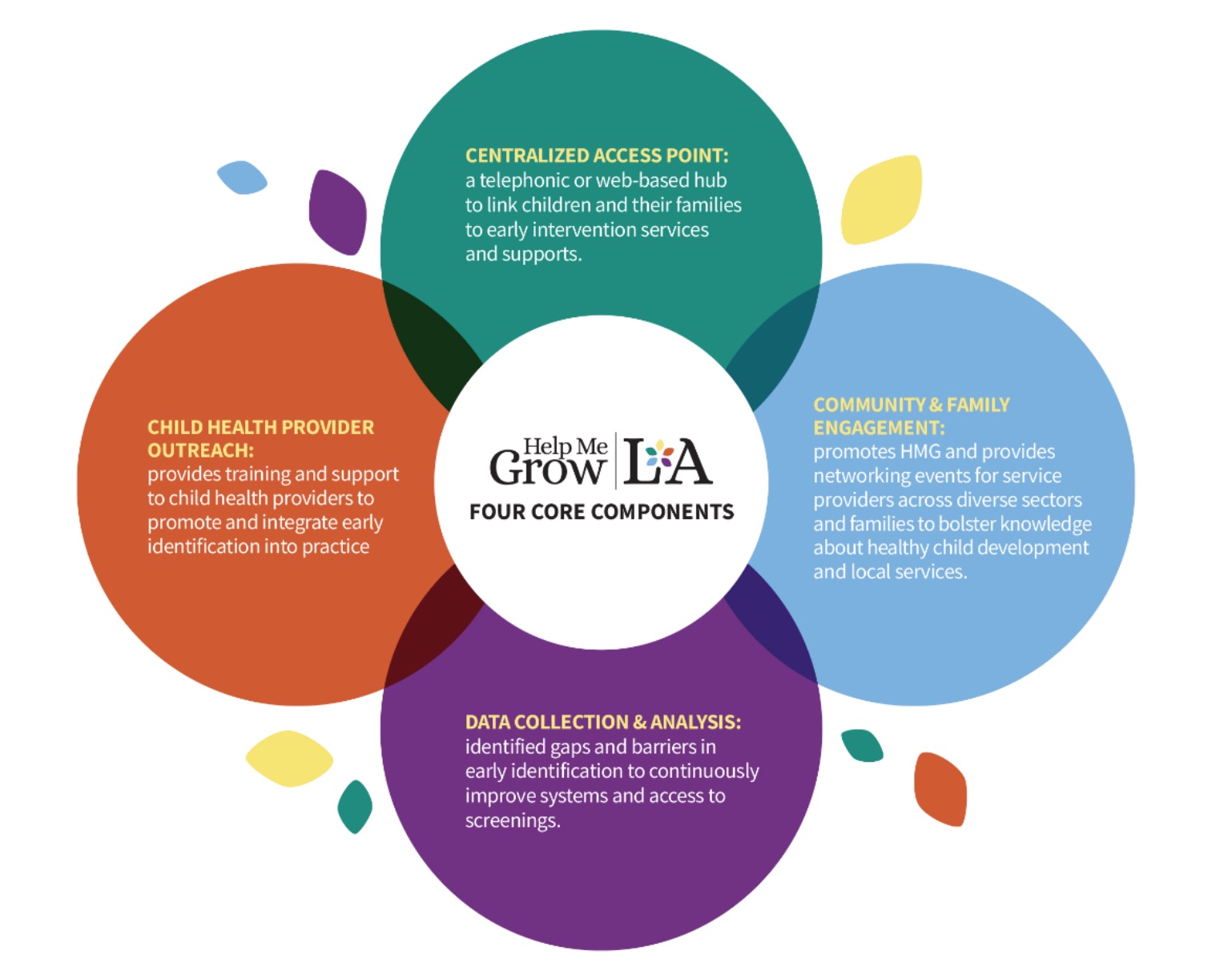

Councils
Community & Family Engagement Council
The Community Family Engagement Council (CFEC) is an advisory group to HMG LA comprised of parent champions, parents and caregivers with community leadership and outreach experience. The role of CFEC is to help ensure early childhood services and resources meet the needs of families with children with, or at risk of, developmental delays and disabilities.
Systems Synergy Council
The HMG LA Systems Synergy Council (SSC) is a group of leaders representing the key systems that comprise the early EII continuum in L.A. County: school districts and local education agencies, child welfare, early care and education, community-based organizations, mental health, health care, regional centers, and family resource centers. The role of the SSC is to help advance HMG LA and EII efforts in their organizations and in L.A. County, creating synergy across systems and helping to ensure health equity for children and families in L.A. County.
Pathways
The HMG LA Pathways is a three-year investment that brings together agencies and programs, which provide early identification and intervention services for developmental delays, with other agencies and families. The goal of HMG LA Pathways is to improve existing referral pathways through technology, infrastructure and practice change to make sure all children get the services they need when they need it. Agencies that are part of Pathways create a collaborative within their community and are tasked with planning, testing and refining strategies so that the referral pathways in their community are more coordinated, integrated and multidirectional. Communities overlap with L.A. County’s seven Regional Center boundaries to ensure countywide reach. The seven Pathways unifying agencies include:
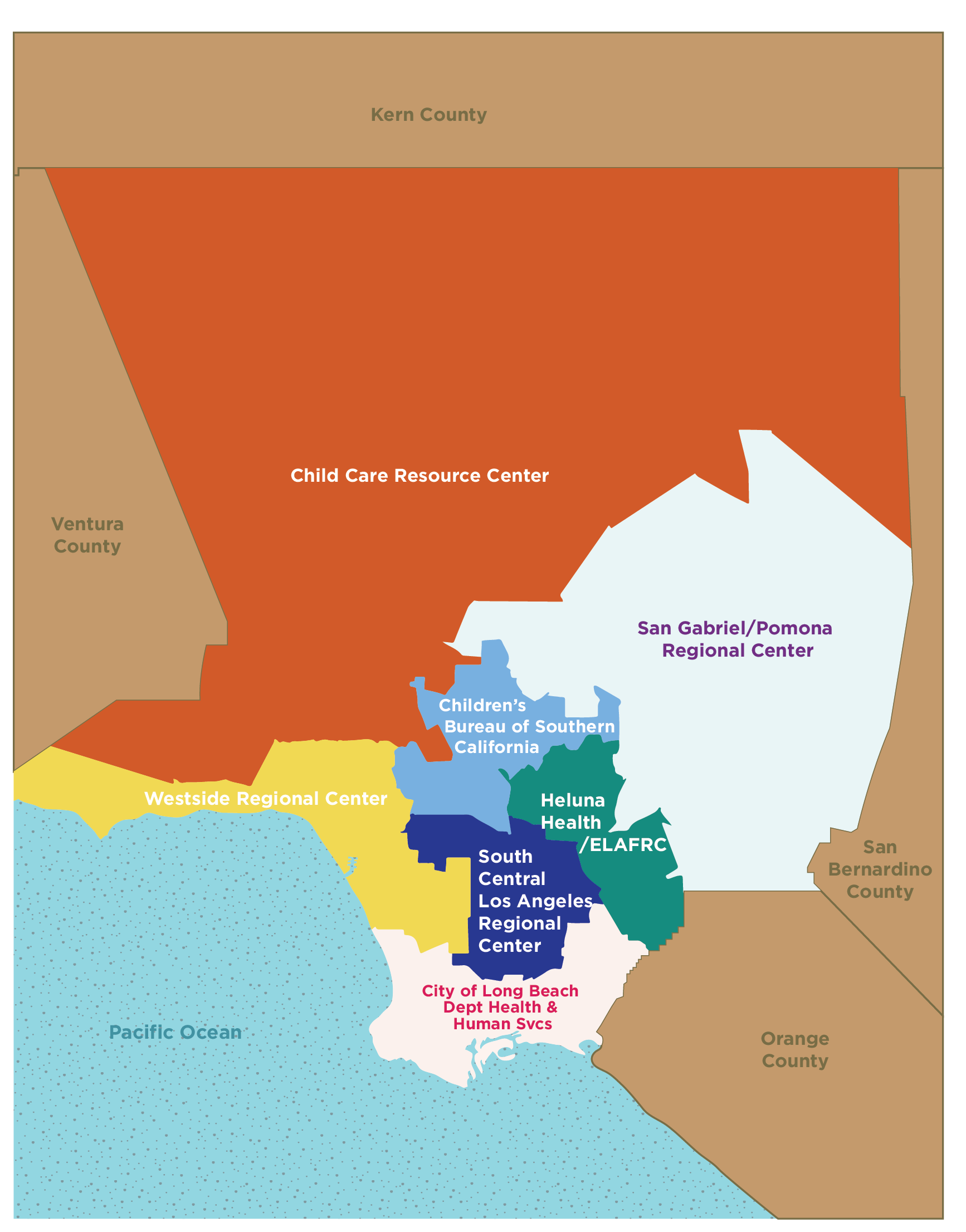
.
- Child Care Resource Center (North LA County)
- San Gabriel/Pomona Regional Center (San Gabriel/Pomona)
- Children’s Bureau of Southern California (Lanterman – Mid-Wilshire/Pasadena)
- Heluna Health/Eastern Los Angeles Family Resource Center (Eastern LA)
- South Central Los Angeles Regional Center (South Central LA)
- Westside Regional Center (Westside)
- City of Long Beach Department of Health and Human Services (Harbor)
L.A. Care Health Plan
The HMG LA partnership with L.A. Care Health Plan is focused on integrating early identification and intervention into practice workflow, as well as increasing awareness and education on the importance of developmental screenings and monitoring across health providers, clinics, community organizations and families. The partnership will leverage L.A. Care’s network of providers, infrastructure and expertise, as well as Community Resources Centers to reach providers, families and children.
The program implemented innovative approaches for community-based providers to embed developmental screening and strengthen referral processes within their practices since 2014 through September 2022. The goal was to better identify children with or at risk for developmental delays and connect them and their families to culturally and linguistically appropriate early intervention services and supports as early as possible. The First Connection partnership has offered valuable learnings and promising practices that informed the planning and implementation of HMG LA. Key partners are:
.

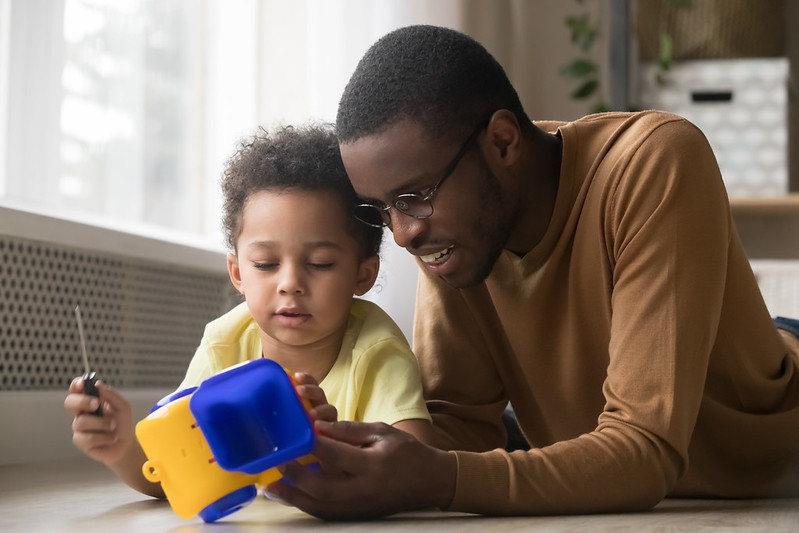
FAMILIES & CAREGIVERS
We all want the best for our children. You are not alone. Help Me Grow LA is here for you when you need extra support to help your child thrive! Help Me Grow LA:
- Connects all families to free or low-cost programs to benefit your child’s development.
- Helps you get the answers you need about your child’s growth milestones.
- Provides information and support during times of need.
Tools & Resources for Your Child’s Development:
.
- First 5 LA Explains Developmental Screenings: About the importance of developmental screenings (video).
- Grow Up Healthy Chart: Growth chart that helps you track your child’s developmental milestones and immunizations.
- Milestone Tracker App: Track your child’s milestones from age 2 months to 5 years with CDC’s easy-to-use illustrated checklists; get tips from CDC for encouraging your child’s development; and find out what to do if you are ever concerned about how your child is developing. Download free on iOS and Android devices in English and Spanish.
- Learn the Signs. Act Early. Milestones in Action: Photo and video library of infants and toddlers showing off their milestones.
- The Early Start Community and Supports: Lists community resources and website for families with young children who have or are at risk for a developmental delay or disability.
- First 5 LA Parenting Guides

HEALTHCARE & COMMUNITY PROVIDERS
Healthcare providers are often the first line of defense. Screening early leads to more successful long-term outcomes. Together, we can make sure all families are supported and provided resources to benefit their child’s developmental health. Below are resources and tools to support the delivery of high-quality early identification and intervention:
- First 5 LA Explains Developmental Screenings: About the importance of developmental screenings (video).
- Early Screening, Better Outcomes: Developmental Screening & Referral Toolkits: Free, practical guides to support early childhood agencies and programs in implementing or refining high-quality developmental screening and linkage for young children. Toolkits were developed for three different settings: Pediatric medical clinics, family serving agencies and family resource centers.
- Navigating the Early Identification and Intervention Maze: A Flowchart: Visual that describes the system as it is intended to work for children 0- to 3-years-old with Medi-Cal insurance.
- Early Identification: Surveillance and Screenings: Issue Brief addresses key challenges and system-level barriers to surveillance and screening plus infographic.
- Linkage to Services and the Referral Process: Issue Brief highlights the various system-level challenges that interfere with linkage to services and the referral process plus infographic.
- Early Identification and Intervention for California’s Infants and Toddlers: 6 Key Takeaways: Brief on the background research conducted to produce the above flowchart, as well as interviews with families, system leaders and advocates suggest that the following areas are most in need of attention to create a system that is family-centered and effective.
- First Connection Evaluation Report: Findings from a year-long evaluation of First 5 LA’s First Connections program that increased early developmental and behavioral screening for young children across six diverse agencies and connected children and their families with culturally and linguistically appropriate services as early as possible.
- New Medi-Cal Policy Expands Access to Family Therapy for Young Children: First 5 Center For Children’s Policy Blog on making family therapy a covered Medi-Cal benefit for children.
- Early Development Resources for Health Care Providers & Early Childhood Professionals: Listing of early development resources (e.g., guides, tip sheets, trainings, etc.) to use by early childhood professionals and family-serving agencies.
RELATED STORIES:
New Study Examines Developmental Concerns of Families in WIC
Ann Isbell | First 5 LA Health Systems Program Officer March 27, 2024 Because parents are deeply attuned to their children, they are often the first to notice a developmental concern. But when they have questions about their child’s developmental progress, many...
Making the News: Developmental Milestones: The (Mostly Good) Ripple Effect of the CDC’s New Developmental Guidelines
May 26, 2022 Earlier this year, the American...
LOS ANGELES COUNTY DEPARTMENT OF PUBLIC HEALTH AND FIRST 5 LA LAUNCH HELP ME GROW LA TO SUPPORT CHILD DEVELOPMENT
MEDIA CONTACTS: First 5 LA Marlene Fitzsimmons (213) 482-7807 mfitzsimmons@first5la.org LA County Department of Public Health (213) 240-8144 media@ph.lacounty.gov May 17, 2022 Help Me Grow LA is a Community-Driven Effort to Ensure Every Child Receives Early Support...
First 5 LA Awarded Grants to Five Agencies to Lead Community Based Efforts as Part of Help Me Grow LA
Funding Will Focus on Connecting Families, Who Have Developmental Concerns, to Existing Services LOS ANGELES, October 1, 2020 — First 5 LA today announced a $2,250,000 investment across five community partners to strengthen and expand referral pathways to better...
Making the News: Developmental Screening
Kids, starting at birth, are expected to meet certain developmental milestones as they grow, including how they use language, how they move (think crawling, running and jumping), how they interact with others, and how they manage and express emotions. Not all children...
A Capitol Day for Early Childhood Advocacy
On a recent flight from Los Angeles to Sacramento, First 5 LA Commissioner Yvette Martinez spoke with a fourth grade teacher about the lack of early developmental screenings for young children, which includes diagnosing autism. With less than 30 percent of young...
Commission Meeting Summary for May 10, 2018
Highlights from the May 10 Commission meeting include approval to amend a Strategic Partnership with the Los Angeles County Department of Public Health for up to $10.1 million over five years as the Help Me Grow-Los Angeles (HMG-LA) Organizing Entity, as well as a...
Connecting Points: Achieving Lasting Change for L.A.’s Youngest Children
By Kim Belshé, Executive Director, First 5 LA The Board of Commissioners meets on the second Thursday of each month at 1:30 p.m., unless otherwise indicated, at the First 5 LA offices. All meetings are open to the public, and agendas are posted on our website at least...
Help Me Grow-LA Releases Report: “Promoting Optimal Children’s Development”
The early design and planning phase for Help Me Grow LA (HMG-LA) just took a major first step toward building, in partnership, a comprehensive and coordinated system to support promoting young children’s optimal development and well-being. Over 60 county agencies,...
Help Me Grow-LA: The Doctor is in
“If L.A. County does it, it could and should be done everywhere.” Delivered by Help Me Grow founder Dr. Paul Dworkin to the First 5 LA Board, those words spoke to the significance of First 5 LA’s collaborative effort to develop Help Me Grow-LA (HMG-LA), a systems-wide...





